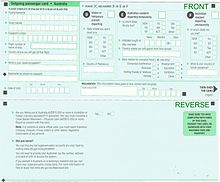- Departure card
-
A departure card, also known as an outgoing passenger card and embarkation card, is a legal document used by a country's immigration authorities to provide passenger identification and an effective record of a person’s entry to and departure from a country. [1] It also serves as a declaration in relation to health and character requirements for non-citizens entering a particular country. [2] The departure card can come attached with its corresponding arrival card with the former being retained in the passport after passport control clearance. The card is then surrendered to passport control upon departure.
Contents
Information on the card itself
Typically the information on the departure card includes
- Full name
- Nationality
- Passport number
- Flight number or name of aircraft, ship or vehicle
- Purpose of trip: vacation, education/study, visiting relatives/families, business, diplomatic
- Duration of stay
- Destination (next stop of disembarkation)
- Address in country
Travelers are also required to sign, date and declare the information is true, correct and complete.
Passengers on international flights required to fill in departure cards need a valid boarding pass and Passport to proceed through immigration checkpoints.
Integration with arrival card
Depending on the jurisdiction, aliens will be issued a card that both has an arrival and departure portion where both share a common serial/control number to facilitate identification. The alien is usually required to retain the latter in his passport and use that same card to exit the country. Some jurisdictions that have this system are Hong Kong, Macau, Malaysia, Singapore, Indonesia, USA, Brazil and Thailand. Hong Kong and Macau have the departure portion as a carbon copy of the landing card but the flight number, next destination and signature are left blank while the latter 6 have a shorter portion for departure cards which require fewer information, but they are joined together as with other to enable immigration officers to tear off one portion as with most ASEAN Nations.
In the United States, the most common example of this is the Form I-94 where the alien, once admitted in the US must retain the departure portion of I-94 card at all times during his stay (passport control officers usually staple this portion to the passport). For air travels, the US is one of the few countries that doesn't have a formal passport control for departing passengers. Hence, once he leaves the US for good, he returns the card through the staff at his departing carrier's check-in counter at the airport (if leaving by air) or to border officers (if leaving by land).
See also
References
External links
Categories:- International law stubs
- Airline terminology
Wikimedia Foundation. 2010.

